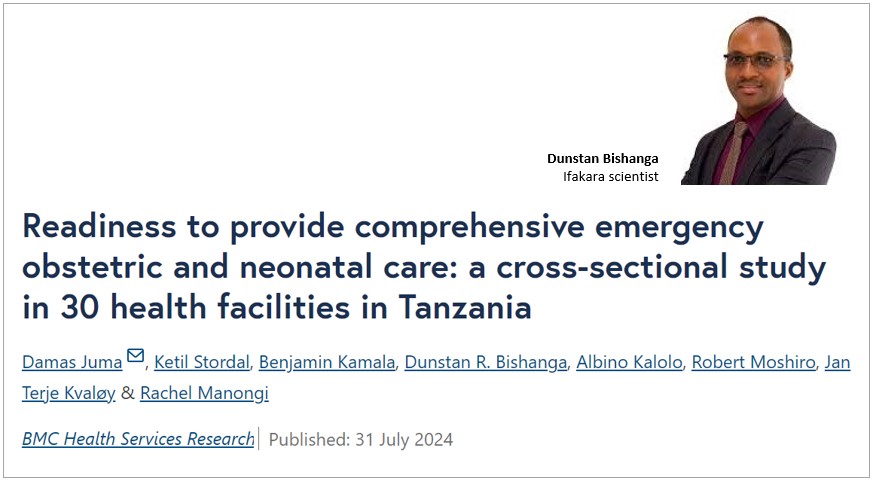
ASSESSMENT: New study links maternal, newborn deaths to “insufficient care”

Despite global efforts to improve the quality of maternal and newborn care, insufficient care remains a leading cause of morbidity and mortality for mothers and their newborns. In Tanzania, a recent study identified significant gaps in the readiness of health facilities to provide emergency obstetric and newborn care, underscoring the critical need to improve their preparedness to deliver quality care.
Assessing readiness across 30 health facilities
The study evaluated the readiness of 30 high-volume health facilities across five regions in Tanzania: Manyara, Tabora, Geita, Shinyanga, and Mwanza – focusing on factors such as amenities, equipment, trained staff, guidelines, medicines, and diagnostic facilities. The overall readiness was assessed at 69%, with regional hospitals scoring the highest, followed by district hospitals.
Key contributions from Ifakara Health Institute
The Ifakara Health Institute contributed to this study, which the Kilimanjaro Christian Medical University College led. Dr. Dunstan Bishanga from Ifakara was among the key contributors to this research, which was published on the BMC Health Services Research journal recently.
“The overall readiness in the assessed facility was found to be 69% which is near 68% found in a recent government of Tanzania assessment. Our findings reveal readiness deficits across all domains, as documented by other studies,” the scientists noted.
“Nevertheless, the overall readiness was highest in regional hospitals, followed by district hospitals, and then health centers. This finding was consistent with other studies conducted in Tanzania and other low and middle-income countries, where higher-level facilities demonstrate better overall readiness,” they added.
While regional hospitals demonstrated the highest readiness levels, followed by district hospitals and health centers, the study noted some substantial disparities existed, with mothers and newborns in lower-level facilities often receiving poor care.
Readiness deficits identified
The study identified readiness deficits in several critical areas, including human resources, equipment, and essential medical supplies. Basic necessities, such as tools for blood sugar measurement and basic antibiotics, were often lacking. These gaps severely impact the quality of care that health facilities can provide.
Additional major issues include inconsistent access to basic utilities like water and electricity, fuel shortages for referral vehicles causing delays in emergencies, and varying availability of clinical guidelines among facilities, with some critical guidelines missing at lower-level facilities. Staffing shortages, particularly in the nursing cadre which is crucial for managing routine and emergency conditions were also highlighted as a major concern.
Recommendations for improvement
To address these challenges, the study calls for comprehensive measures to improve the readiness of health facilities to deliver quality maternal and newborn care. These include ensuring adequate amenities, equipment, and commodities for diagnosis and treatment, and staffing and improving the distribution of clinical guidelines.
Moreover, the scientists strongly recommend implementing continuous quality improvement systems to address deficiencies and conducting regular assessments to monitor progress in facility readiness and ensure implementation of identified actions to improve the quality of services.
Government, stakeholders to address deficiencies
They called on the government, implementing partners, and other stakeholders to take immediate action to address the observed deficiencies, carefully selecting the most feasible and effective interventions.
“Facilities' readiness was inadequate and varied across different levels, but, there is room to improve readiness to deliver quality maternal and newborn care. The responsible authorities should take immediate action to address the observed deficiencies while carefully choosing the most effective and feasible interventions and monitoring progress in readiness," concluded the scientists.
Read the publication here.
